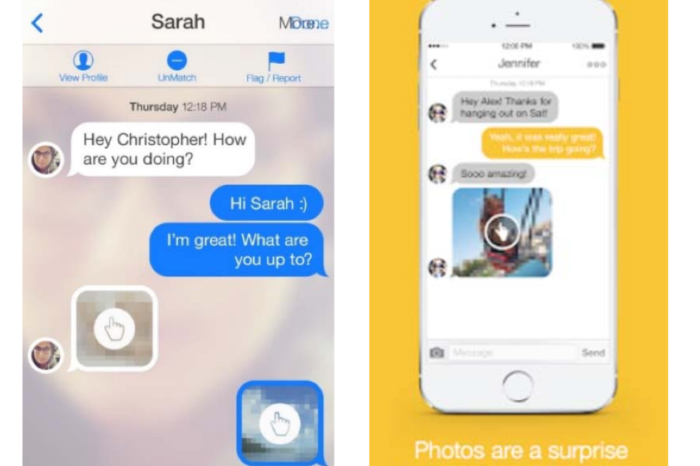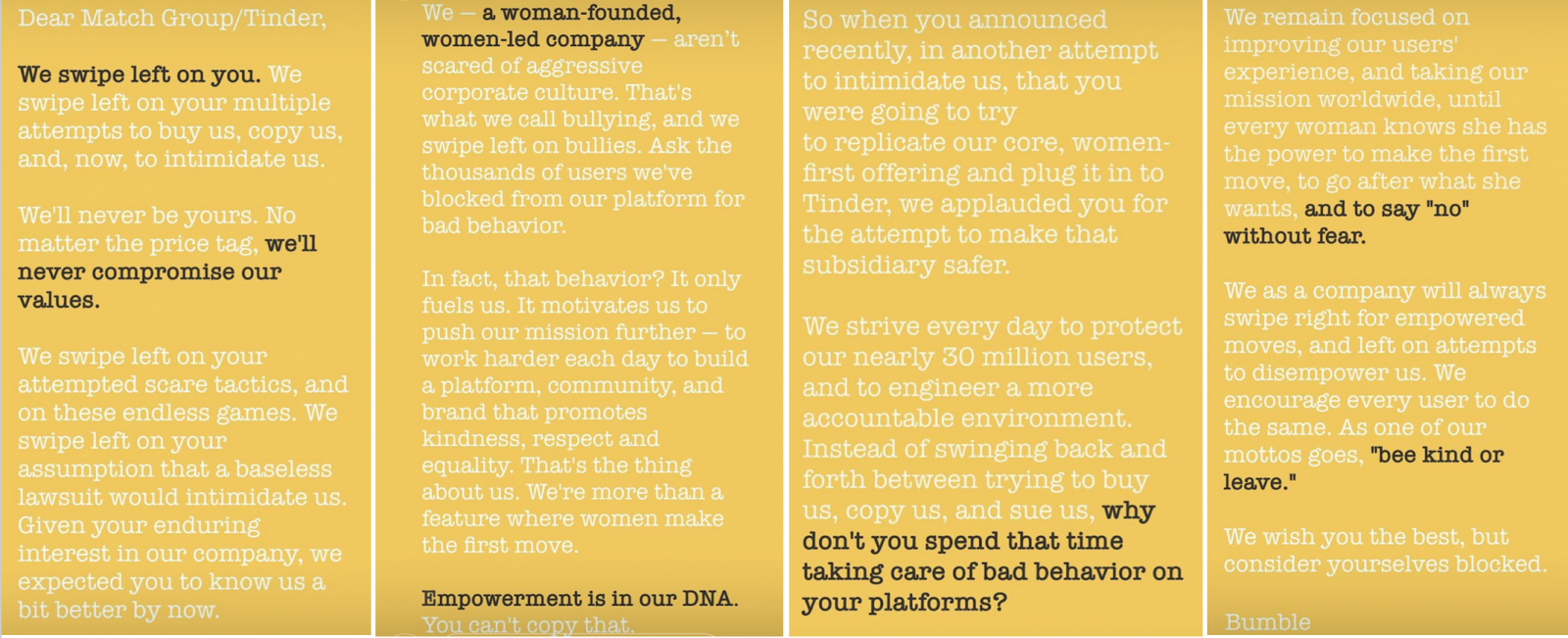The lawsuit that has been in the making since Whitney Wolfe Herd, one of the co-founders of Tinder, launched her $1 billion app, Bumble, in December 2014 at age 24 (just three months after she sued Tinder for sexual discrimination and harassment and settled for just over $1 million in September 2014) is here. Match.com, the online dating conglomerate that owns Tinder, is suing Bumble.
According to the lengthy complaint that Match filed on Friday in federal court in Texas, three Tinder executives left the company, and exactly one year later on the dot, launched Bumble, which is, Match asserts, is a “virtually identical” copy of Tinder’s “world-changing” app.
How were the three execs able to replicate Tinder’s app so perfectly? Well, among other things, they “were given access to certain confidential information related to proposed Tinder features” and allegedly took that info with them when they jumped ship to launch Bumble.
In the lawsuit, which cites trademark infringement and dilution, utility and design patent infringement, trade dress infringement, trade secret misappropriation, and unfair competition, amongst other claims, Match alleges that “through Tinder, [it has] spent significant time and effort developing and implementing the inventions embodied in versions of the Tinder app,” only to have a significant portion of its features recreated by Bumble, in its quest “to mimic Tinder’s functionality, trade off of Tinder’s name, brand, and general look and feel, meet user expectations that Tinder itself and its brand created, and build a business entirely on a Tinder-clone, distinguished only by Bumble’s women-talk-first marketing strategy.”
In its lawsuit, which is a knock-down drag-out dissertation of nearly every type of intellectual property claim available in the U.S., Match alleges that Bumble infringes its valuable utility patent, which gives Tinder the exclusive right to use to “a computer implemented method of profile matching.” Bumble also infringes one of its design patents, which covers “an ornamental design where photographic cards are swiped left or right,” i.e., the overall appearance of Tinder’s swiping functionality.

Match alleges that Bumble infringes a number of its trademarks, including “swipe,” for which it has a federally registered trademark for use on computer application software for mobile devices. It also maintains common law trademark rights and has filed federal trademark applications also currently seeking federal registrations for “swipe left” and “swipe right” in connection with mobile applications for social introduction and dating services.”
According to Match, Bumble has been infringing this mark by making “extensive use of Tinder’s registered ‘swipe’ mark as well as its ‘swipe left’ and ‘swipe right’ word marks.” For example, Match claims that “in its ‘About Us’ section of its website, Bumble describes itself as an app that ‘shows you the people you want to see and lets you connect by a mutual opt in by swiping right.’” Additionally, “In press interviews, Bumble’s CEO repeatedly references ‘swipes,’ ‘swipe left’ and ‘swipe right.’”
Additional ornamental features that Bumble copied from Tinder (according to Match), include the feature, in which “swiping left indicates a user is not interested in the person shown while swiping right indicates that the user is interested in the person;” the feature by which “two users cannot communicate until they both indicate interest in one another;” the feature which means that “if two users both indicate interest, a screen is shown indicating a ‘match.’Bumble’s ‘match’ screen is nearly identical to Tinder’s;” and the “match queue” screen, “where users can find new matches and ongoing conversations with other matches, is also essentially identical.”

In violation of Tinder’s trade dress rights, Match alleges that Bumble copies the ornamental design of Tinder’s “It’s a Match!” screen, where photographic cards are swiped left or right.
And in one of the more intriguing claims that Match makes, the company alleges that the Tinder app was first conceived of and created by Sean Rad, Justin Mateen, Jonathan Badeen, Joe Munoz, Chris Gulczynski, Whitney Wolfe-Herd. Match claims that “in connection with their employment at [Tinder/Match], Chris Gulczynski and Sarah Mick [joined Tinder in 2013, after Tinder’s initial launch as its “Vice President of Design”] were given access to certain confidential information related to proposed Tinder features,” including the “development for a potential ‘undo’ function for the Tinder app.”
In March of 2015, Match claims that “Bumble implemented a nearly, if not literally, identical concept in its ‘Backtrack’ feature,” complete with “the same white hand [design] surrounded by a white circle over the blurred image.” These co-founders of Bumble, who “previously worked with Tinder have inappropriately used confidential information related to Bumble’s backtrack function.”

Match is seeking “full profits” from Bumble in connection with its alleged design patent infringement, which could set Bumble back significantly, given that its revenue was expected to surpass $100 million last year. The company was valued at more than $1 billion in late 2017. However, potentially more likely than the parties sparring in court, according to Axios, the suit might be a way for Match to restart the stalled negotiations in which the parties were engaged after Match offered to buy Bumble for $450 million last summer. Bumble “swiped left” on that offer.
As of Saturday, Bumble has not responded to the suit, whereas a spokesman for Match told Axios: “Match Group has invested significant resources and creative expertise in the development of our industry-leading suite of products. We are committed to protecting the intellectual property and proprietary data that defines our business. Accordingly, we are prepared when necessary to enforce our patents and other intellectual property rights against any operator in the dating space who infringes upon those rights.”
UPDATED (March 20, 2018): Bumble has responded to Match’s complaint by posting the following on Instagram …

* The case is Match Group, LLC, v. Bumble Trading Inc., 6:18-cv-00080 (W.D. Tex.).











